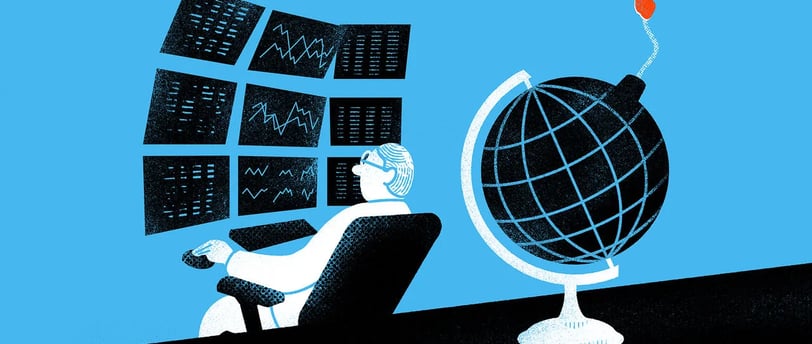THE SILENT EPIDEMIC: PREDATORS IN SUIT
White-collar Crimes in the Third World
Manisha Ghosh
4/25/20254 min read


Is economic exploitation embodied only in what we see right before our eyes? Is illiteracy and unawareness to the contemporary world situation only the real deal? What if manipulation is presented before our eyes in the most sophisticated way? What if the witty cheating plans come from the most intelligent minds? Beneath the modesty of intellect and furnished reputation, underlies the veiled malfeasance of economic exploitation. “COLONIES TO CORPORATES” – a proper rhetoric hiding the heinous subjugation of human worth and morality. Under the façade of broader development in the Global South, the most vulnerable populations are presented with damages. Even if there are notable improvements – these are undeniably “poisonous”. Here comes in the play of White-collared personnels – swindling capital and resources in the name of profit.
PETRIFYING WHITE – WHITE COLLAR CRIMES
White-collar crime was originally defined by Edwin Sutherland as a non-violent, financially motivated criminal behavior perpetrated by individuals in positions of trust. The Global South comprising nations of Latin America, parts of Asia and Africa continues to grapple with lingering effects of colonial exploitation. One of the most insidious legacies of colonial rule is the structural entrenchment of white-collar crime, a phenomenon that perpetuates economic disparity, political instability and social alienation. Fraud, embezzlement and money-laundering often undermine public trust in institutions, exacerbate social inequalities and distort market competition. White-collar crimes disproportionately impact minority and vulnerable populations by diverting resources in the name of public welfare, especially in Global South where the governance structures are still weaker due to colonial legacies.
POST – COLONIAL TRAUMA, ECONOMIC EXPLOITATION AND OUTSOURCING:
The Global South is marked by historical patterns of exploitation. These countries have become grounds for white-collar crimes like corruption, tax evasion and illegal resource exploitation. Usually cloaked under the rhetoric of reconstruction and economic growth, they serve to further enrich a narrow elite while deepening socio-economic inequalities and undermining public trust.
The predators of white-collar crimes benefit from an implicit state protection that dehumanizes the local communities, reinforcing colonial hierarchies and exacerbating collective trauma. Philippe le Billion in “Peacebuilding and white-collar crime in post-war natural resource sectors”, argued that white-collar criminalization creates “negative economies”, in which the benefits of reconstruction are unevenly distributed and the voices of those most affected by exploitation remain silenced. The persistence of white-collar crimes in post-colonial contexts is both a symptom and a cause of dehumanization. As corrupt elites exploit state resources and engage in practices that marginalize local populations, they reinforce a narrative in which these populations are seen as inherently less worthy.
The business strategies of outsourcing create layers of complexity between a company’s oversight operations and core mechanisms. Companies while outsourcing services, rely on third-party workers. This can dilute a firm’s regulation and monitoring. Different management and regulatory environments make it easier to carry out fraudulent practices. Many multinational corporations (MNCs) outsource operations to the developing countries of the Global South with low labor cost and less stringent regulations. These become the hubs for the fraudsters to launder money or hide illicit transactions.
GLOBAL SOUTH CASE STUDIES:
Mention can be made some of the white-collar crime cases across the Global South countries:
Perhaps one of the most notorious white-collar crime cases in Latin America, the ODEBRECHT SCANDAL, spans multiple countries. The Brazilian construction giant Odebrecht systematically paid bribes over several years to secure public works contracts in countries like Brazil, Mexico and Venezuela. These corrupt practices not only resulted in inflated project costs and massive economic losses but also undermined public trust in state institutions and led to a widespread reform effort across the region.
South Africa has witnessed a dramatic case of white-collar crime. Emerging from the post-apartheid era, the GUPTA FAMILY used their close ties to political figures to secure lucrative state contracts and manipulate financial institutions. Their activities ranged from bribery and money laundering to improper influence in awarding state tenders in sectors such as mining, energy and media.
One of the most famous cases of white-collar crime in India is the SATYAM COMPUTER SERVICES accounting fraud. Satyam Computer Services grew to become one of India’s leading IT outsourcing firms, employing over thousands of people. In January 2009, the Company’s founder and chairman, Byrraju Ramalinga Raju confessed about a massive accounting fraud. He admitted that Satyam’s books had been manipulated for several years to inflate revenues, profits and cash balances by billions of rupees.
Another notable white-collar crime case was the 2003 MYANMAR BANKING CRISIS which exhibited the convergence of banking fraud and political corruption. The crisis was fueled by a significant gap in Myanmar’s financial regulatory framework. Investors were enticed by exorbitant interest rates, which were not supported by underlying economic fundamentals. The crisis not only devastated individual investors but also disrupted the broader economy, undermining trust in financial institutions and hindering economic development.
CONCLUSION:
The convergence of white-collar crime post-colonial trauma and dehumanization in the Global South underscores the persistent influence of colonial legacies on contemporary socio-politico-economic structures. Corruption and resource exploitation often disguised as legitimate economic activities, continue to exploit and marginalize communities, reinforcing cycles of dehumanization and trauma. White-collar crime also illustrates how an environment marked by regulatory gaps, corruption and weak governance cultivates large-scale financial fraud. This necessitates not only need for the development of a robust and transparent framework of economic activities labelled as development but also deeper indulgence in policy-making so as to remove the exploitative colonial imprints from the psyche of the people and carve out inclusive policies.
REFERENCES:
1. Philippe Le Billion – “Peacebuilding and White-collar crime in post-war natural resource sectors”
2. Edwin H. Sutherland – “White-collar Criminality”
3. Susan P. Shapiro – “Collaring the Crime: Reconsidering the Concept of White-collar Crime”
4. “Global Implications of White Collar Crime”
Image courtesy: The Economist
